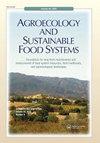饲料适应原在生猪有机生产理念形成中的作用
IF 2.6
3区 农林科学
Q1 AGRICULTURE, MULTIDISCIPLINARY
Agroecology and Sustainable Food Systems
Pub Date : 2023-07-13
DOI:10.21323/2618-9771-2023-6-2-255-260
引用次数: 0
摘要
俄罗斯联邦科技发展战略(2016年12月1日第642号总统令批准)的优先事项之一是向高产和环境友好型农业过渡。有机农业只有作为农业生产系统的一部分加以实施,才能帮助确保到2050年为人口提供足够的粮食,同时减少农业对环境的影响,而农业生产系统应提供与基线情景相同的产品数量和组成。有机畜牧生产的一个重要方面是减少应激因素对动物的影响。一个有希望的解决方案是使用具有明显抗氧化特性的天然生物活性物质。本文研究了天然生物黄酮类化合物(Taxifolin)及其复合维生素在各种原因(气候、饲料、社会等)应激期间对育肥猪机体的作用。一种包括维生素C、维生素E和紫杉醇的复合物已经被开发出来。试验研究了利用所研究的营养因子来降低应激因子对肉品质的负面影响的猪饲养方法的规定。本文章由计算机程序翻译,如有差异,请以英文原文为准。
Role of feed adaptogens in forming the concept of organic pig production
One of the priorities of the Strategy of scientific and technological development of the Russian Federation (approved by Presidential Decree № 642 of December 1, 2016) is the transition to a highly productive and environmentally friendly agriculture. Organic agriculture can help to ensure sufficient food for the population by 2050 and simultaneously reduce the impact of agriculture on the environment only if it is implemented as part of a system of agricultural production, which should provide the same volume and composition of products as in the baseline scenario. An important aspect of organic livestock production is to reduce the impact of stress factors on animals. A promising solution can be the use of natural biologically active substances with pronounced antioxidant properties. The action of natural bioflavonoids (Taxifolin) and also in a complex with vitamins on the organism of fattening pigs during the periods of stress of various etiology (climatic, fodder, social etc.) has been studied. A complex including vitamin C, vitamin E and Taxifolin has been developed. The provisions of the method of feeding pigs as a way to reduce the negative impact of stress factors on meat quality by means of the studied nutritional factor have been studied experimentally.
求助全文
通过发布文献求助,成功后即可免费获取论文全文。
去求助
来源期刊

Agroecology and Sustainable Food Systems
AGRICULTURE, MULTIDISCIPLINARY-GREEN & SUSTAINABLE SCIENCE & TECHNOLOGY
CiteScore
4.80
自引率
7.70%
发文量
73
期刊介绍:
Agroecology and Sustainable Food Systems is devoted to the rapidly emerging fields of agroecology and food system sustainability. By linking scientific inquiry and productive practice with transformative social action, agroecology provides a foundation for developing the alternative food systems of the future. The journal focuses on the changes that need to occur in the design and management of our food systems in order to balance natural resource use and environmental protection with the needs of production, economic viability, food security, and the social well-being of all people.
Agroecology and Sustainable Food Systems examines our current food systems from production to consumption, and the urgent need to transition to long-term sustainability. The journal promotes the study and application of agroecology for developing alternatives to the complex problems of resource depletion, environmental degradation, a narrowing of agrobiodiversity, continued world hunger, consolidation and industrialization of the food system, climate change, and the loss of farm land. The journal uses a food systems approach, and seeks experiences in agroecology that are on-farm, participatory, change-oriented, and backed by broad-based methodologies of sustainability analysis and evaluation.
 求助内容:
求助内容: 应助结果提醒方式:
应助结果提醒方式:


